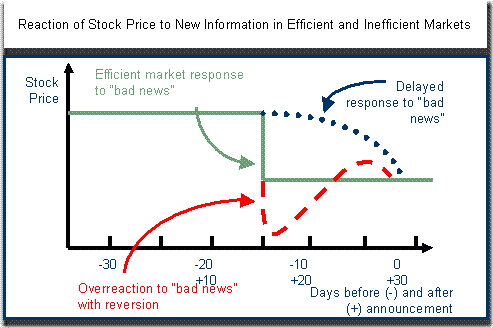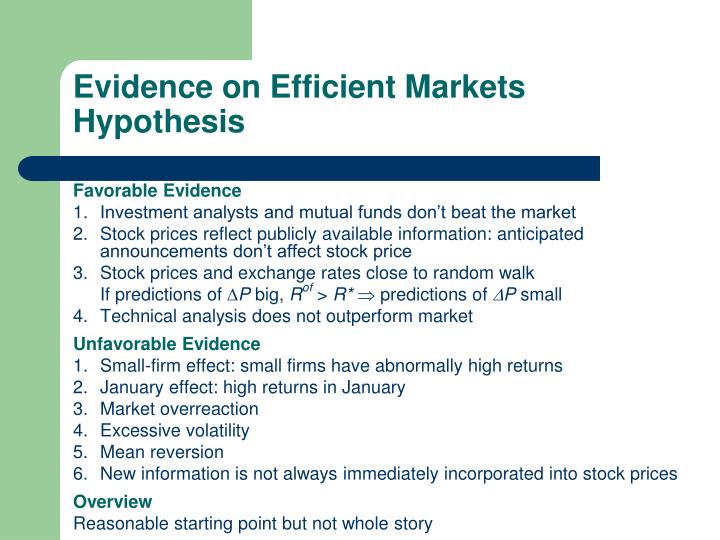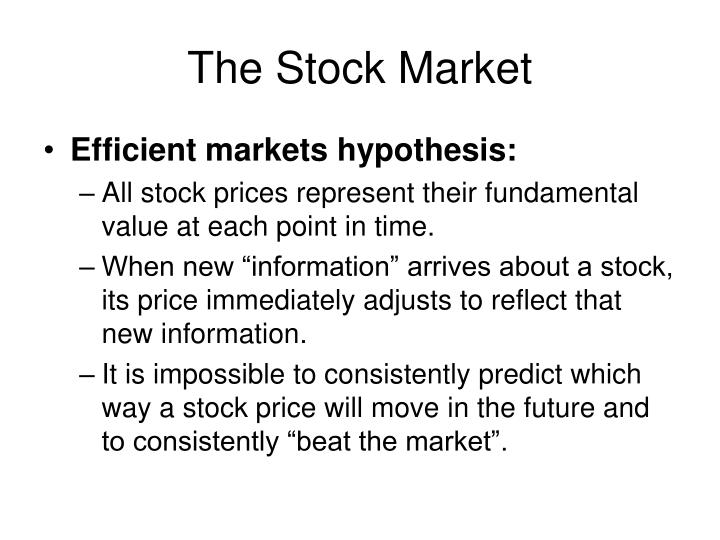Stock market efficient hypothesis
An important debate among stock market investors is whether the market is efficient - that is, whether it reflects all the information made available to market participants at any given time. The efficient market hypothesis EMH maintains that all stocks are perfectly priced according to their inherent investment properties, the knowledge of which all market participants possess equally.
At first glance, it may be easy to see a number of deficiencies in the efficient market theory, created in the s by Eugene Fama. At the same time, however, it's important to explore its relevancy in the modern investing environment.
For background reading, see What Is Market Efficiency? Behavioral Finance Financial theories are subjective.
In other words, there are no proven laws in finance, but rather ideas that try to explain how the market works. Here we'll take a look at where the efficient market theory has fallen short in terms of explaining the stock market's behavior.
EMH Tenets and Problems with EMH First, the efficient market hypothesis assumes that all investors perceive all available information in precisely the same manner. The numerous methods for analyzing and valuing stocks pose some problems for the validity of the EMH.
Efficient Market Hypothesis
If one investor looks for undervalued market opportunities while another investor evaluates a stock on the basis of its growth potential, these two investors will already have arrived at a different assessment of the stock's fair market value.
Therefore, one argument against the EMH points out that, since investors value stocks differently, it is impossible to ascertain what a stock should be worth under an efficient market.
Secondly, under the efficient market hypothesis, no single investor is ever able to attain greater profitability than another with the same amount of invested funds: But consider the wide range of investment returns attained by the entire universe of investors, investment funds and so forth. According to the EMH, if one investor is profitable, it means the entire universe of investors is profitable. In reality, this is not necessarily the case.
Thirdly and closely related to the second point , under the efficient market hypothesis, no investor should ever be able to beat the market, or the average annual returns that all investors and funds are able to achieve using their best efforts. For more reading on beating the market, see the frequently asked question What does it mean when people say they "beat the market"? How do they know they've done so? This would naturally imply, as many market experts often maintain, that the absolute best investment strategy is simply to place all of one's investment funds into an index fund , which would increase or decrease according to the overall level of corporate profitability or losses.
There are, however, many examples of investors who have consistently beat the market - you need look no further than Warren Buffett to find an example of someone who's managed to beat the averages year after year. To learn more about Warren Buffett and his style of investing, see Warren Buffett: How He Does It and The Greatest Investors.
Of course, it's impossible for the market to attain full efficiency all the time, as it takes time for stock prices to respond to new information released into the investment community.
The efficient hypothesis, however, does not give a strict definition of how much time prices need to revert to fair value. Moreover, under an efficient market, random events are entirely acceptable but will always be ironed out as prices revert to the norm. It is important to ask, however, whether EMH undermines itself in its allowance for random occurrences or environmental eventualities. There is no doubt that such eventualities must be considered under market efficiency but, by definition, true efficiency accounts for those factors immediately.
In other words, prices should respond nearly instantaneously with the release of new information that can be expected to affect a stock's investment characteristics.

So, if the EMH allows for inefficiencies, it may have to admit that absolute market efficiency is impossible. Although it is relatively easy to pour cold water on the efficient market hypothesis, its relevance may actually be growing. With the rise of computerized systems to analyze stock investments, trades and corporations, investments are becoming increasingly automated on the basis of strict mathematical or fundamental analytical methods.

Given the right power and speed, some computers can immediately process any and all available information, and even translate such analysis into an immediate trade execution. Despite the increasing use of computers, however, most decision-making is still done by human beings and is therefore subject to human error.

Even at an institutional level, the use of analytical machines is anything but universal. While the success of stock market investing is based mostly on the skill of individual or institutional investors , people will continually search for the surefire method of achieving greater returns than the market averages. Conclusion It's safe to say the market is not going to achieve perfect efficiency anytime soon. For greater efficiency to occur, the following criteria must be met: It is hard to imagine even one of these criteria of market efficiency ever being met.
Dictionary Term Of The Day. A measure of what it costs an investment company to operate a mutual fund. Latest Videos PeerStreet Offers New Way to Bet on Housing New to Buying Bitcoin? This Mistake Could Cost You Guides Stock Basics Economics Basics Options Basics Exam Prep Series 7 Exam CFA Level 1 Series 65 Exam. Sophisticated content for financial advisors around investment strategies, industry trends, and advisor education. Is The Stock Market Efficient? By Jason Van Bergen Share.
The efficient market hypothesis EMH suggests that stock prices fully reflect all available information in the market. An understanding of neuroscience and the decision-making process provides a resolution to the decades-old debate between proponents and critics of the Efficient Market Hypothesis.
An investment theory that states it is impossible to "beat the market". Find out if mutual fund managers can successfully pick stocks or if you're better off with an index fund.
Economic efficiency is achieved when every resource is optimally allocated to minimize waste and best serve each person in that economy. Fractal Market Hypothesis has emerged as an alternative to longstanding economic theories due to its ability to explain investor behavior during crises. Discover what you need to know before becoming your own money manager.
The 3 Forms of the Efficient Market Hypothesis
Key 20th-century financial theories changed the way investors viewed markets and created the circumstances in which ETFs could emerge. Found out what the efficient market hypothesis says about the fair value of securities, and learn why technical and fundamental Find out about the key assumptions behind the efficient market hypothesis EMH , its implications for investing and whether Find out what the efficient markets hypothesis has to say about fundamental analysis and how recent finance research has Learn about why there are strong conceptual differences between the efficient market hypothesis and technical analysis about Explore the efficient market hypothesis and understand the extent to which this theory and its conclusions are correct or When people talk about market efficiency they are referring to the degree to which the aggregate decisions of all the market's An expense ratio is determined through an annual A hybrid of debt and equity financing that is typically used to finance the expansion of existing companies.
Investing Basics: What Is The Efficient Market Hypothesis, and What Are Its Shortcomings? - kysiqubonypun.web.fc2.com
A period of time in which all factors of production and costs are variable. In the long run, firms are able to adjust all A legal agreement created by the courts between two parties who did not have a previous obligation to each other.
A macroeconomic theory to explain the cause-and-effect relationship between rising wages and rising prices, or inflation. A statistical technique used to measure and quantify the level of financial risk within a firm or investment portfolio over No thanks, I prefer not making money.
Content Library Articles Terms Videos Guides Slideshows FAQs Calculators Chart Advisor Stock Analysis Stock Simulator FXtrader Exam Prep Quizzer Net Worth Calculator. Work With Investopedia About Us Advertise With Us Write For Us Contact Us Careers.
Get Free Newsletters Newsletters. All Rights Reserved Terms Of Use Privacy Policy.